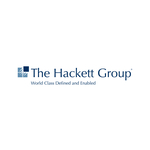The Hackett Group’s Key Issues Research Identifies Increasing Workload and Declining HR Budgets as Major Factors
MIAMI & LONDON–(BUSINESS WIRE)–HR leaders lack confidence in their ability to achieve seven of their top 10 priorities for 2022, according to new HR Key Issues research from The Hackett Group, Inc. (NASDAQ: HCKT). It will take improvements in digital transformation, talent strategies and more for them to succeed.
One key issue driving the problem is an expected decline in budgets and only a small increase in headcount in the face of a workload increase of more than 9%. HR leaders are counting in part on increased technology spending to help fill productivity and efficiency gaps.
The full research, “The HR Agenda: 2022 Key Issues,” is available from The Hackett Group® on a complimentary basis, with registration, at this link: http://go.poweredbyhackett.com/22hrkey2201sm.
Key findings from the research include:
Seven of the Top Ten HR Priorities May be Difficult to Achieve – Of the top 10 priorities for HR in 2022, 7 represent objectives that HR executives lack confidence they can achieve, the research found. The majority of HR organizations have launched or are launching major initiatives to improve their capabilities to: enable enterprise growth strategies: support digital transformation; create a high-performing organizational culture, and improve talent management. But in order to close capability gaps, HR organizations must take greater advantage of digital technology to improve their service delivery and insights, as well as upgrade talent strategies, programs, and processes to enable achievement of top enterprise and human capital-related business objectives.
HR Performance Driven by Growing Budget and Staffing Gaps – One of the reasons HR executives may lack the overall confidence to address top priorities is that HR expects its budget to decline by 0.2% and head counts to increase by just 0.4% in 2022, the study found. With workloads projected to jump by 9.3%, HR will need to make up an 8.9% productivity gap and 9.5% efficiency shortfall during the year.
Technology Spend Accelerates to Fill the Resource Gap – Facing another demanding year of “doing more with less,” HR will rely on technology to increase productivity, efficiency and effectiveness. HR technology spending is expected to increase by more than 9% in 2022, according to the study. To reap the full benefits of these investments, HR organizations will need to intensify their efforts at digital transformation and harnessing data and insights from analytics. Sixty-eight percent of study respondents have already broadly deployed next-generation, cloud-based core applications, and a further 24% have small-scale implementations in place. Business process management/workflow tools are now well established, and data-related technology adoption is also widespread. Robotic process automation (RPA) continues to make inroads within HR, although with mostly small-scale implementations.
HR Struggling with Talent Retainment and Recruiting Pressures – In addition, HR executives are feeling increased pressures on their recruiting processes, the research found. Amid increasing difficulties retaining talent and filling open positions, HR has struggled to determine practical hybrid work strategies and prevent workforce burnout. HR must improve both its own talent management capabilities and the capabilities of managers across the enterprise. HR organizations also continue to struggle to transform themselves, in particular, to enhance their ability to act as a strategic advisor while meeting day-to-day demands of the business. It is critical for HR to devote attention to three best practices areas: elevate/solidify relationships; transform the operating model; and close skills gaps.
HR-Related Tech Skills are Also Lacking – HR has chronically lagged in key business and technology-related skills that are essential to digital transformation. Competencies such as the ability to derive meaningful insights from data, proficiency using digital technologies, critical thinking and adaptability to changing priorities remain underrepresented among HR groups, as are highly prized skills, such as business acumen and the ability to innovate.
Strategic Advisor Role is a Top Priority – For the second year in a row, the top HR priority is to act as a strategic advisor to the business. This will continue to be a struggle for most firms as they battle the higher demands on the recruiting front and “doing more with less.” The pandemic thrust HR into an even more vital role to help navigate a range of health, safety, culture, productivity and employee engagement challenges. But many must upgrade their staff skills and support capabilities to more successfully play this role.
The Hackett Group’s 2022 Key Issues research is based on results gathered from more than 250 executives in IT, finance, HR, procurement, supply chain, and global business services at a global set of midsized and large enterprises.
About The Hackett Group
The Hackett Group, Inc. (NASDAQ: HCKT) is an intellectual property-based strategic consultancy and leading enterprise benchmarking firm to global companies, offering digital transformation, including implementation of leading enterprise cloud applications, workflow automation and analytics that enable Digital World Class™ performance.
Drawing from our unparalleled IP from nearly 20,000 benchmark studies with the world’s leading businesses – including 97% of the Dow Jones Industrials, 94% of the Fortune 100, 70% of the DAX 30 and 51% of the FTSE 100 – captured through our leading benchmarking platform, Quantum Leap® and our Digital Transformation Platform (DTP), we accelerate best-practice implementations.
More information on The Hackett Group is available at: www.thehackettgroup.com, info@thehackettgroup.com, or by calling (770) 225-3600.
The Hackett Group, quadrant logo, World Class Defined and Enabled, and Quantum Leap are the registered marks of The Hackett Group.
Cautionary Statement Regarding “Forward-Looking” Statements
This release contains “forward-looking” statements within the meaning of Section 27A of the Securities Act of 1933 as amended and Section 21E of the Securities Exchange Act of 1934, as amended. Statements including without limitation, words such as “expects,” “anticipates,” “intends,” “plans,” “believes,” seeks,” “estimates,” or other similar phrases or variations of such words or similar expressions indicating, present or future anticipated or expected occurrences or outcomes are intended to identify such forward-looking statements. Forward-looking statements are not statements of historical fact and involve known and unknown risks, uncertainties and other factors that may cause the Company’s actual results, performance or achievements to be materially different from the results, performance or achievements expressed or implied by the forward-looking statements. Factors that may impact such forward-looking statements include without limitation, the ability of The Hackett Group to effectively market its digital transformation and other consulting services, competition from other consulting and technology companies that may have or develop in the future, similar offerings, the commercial viability of The Hackett Group and its services as well as other risk detailed in The Hackett Group’s reports filed with the United States Securities and Exchange Commission. The Hackett Group does not undertake any duty to update this release or any forward-looking statements contained herein.
Contacts
Gary Baker, Global Communications Director – (917) 796-2391 or gbaker@thehackettgroup.com



